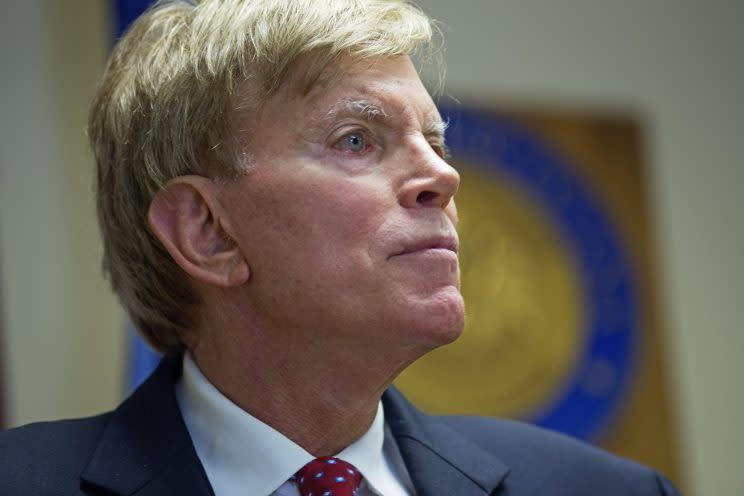Southern Poverty Law Center: If David Duke’s godson can leave white nationalism, others can too

Derek Black had been primed to follow in his white nationalist father’s footsteps, but he has turned his back on racism with the help of a Jewish friend at college.
Black is the son of Don Black, the former Ku Klux Klan grand wizard who founded the white nationalist website Stormfront, and the godson of David Duke, a former “Imperial Wizard” for the Klan and perhaps the best-known white supremacist in the U.S.
This weekend, the Washington Post published an in-depth article — titled “The white flight of Derek Black” — about how the younger Black’s experiences with students of other ethnicities and religions at New College of Florida, a liberal arts school in in Sarasota, led to him renouncing white nationalism. He now embraces multiculturalism, admires President Barack Obama and supports increased immigration.
Black had been ready to assume the mantel of his elders: He spoke at white nationalist meetings, launched a white national children’s website, hosted a radio show and won a local election in Florida.
Heidi Beirich, the leader the Southern Poverty Law Center’s (SPLC) Intelligence Project, an anti-terrorism organization, said a lot of people join white supremacist movements because they’re escaping difficult family situations or get caught up as teens. But she said Black’s case was difference because he had been “born and bred” to be a white supremacist leader.

“Derek Black was raised to be white supremacy royalty. His entire life, from the day he got on this planet, his family was grooming him for leadership roles, they were inculcating him in these ideas,” she said in an interview with Yahoo News. “You couldn’t really be more deep in the white supremacist movement than Derek was. So him leaving the movement and the process he’s gone through is rather extraordinary.”
Beirich, an expert on nativist and neo-Confederate movements, said Black’s tale demonstrates the power that education and different experiences can have on one’s worldview. She said getting out of the household and the “family business” gave Black the opportunity to change.
According to the Post, Black decided to hide his racist beliefs at college but was outed April 2011 on a message board by an upperclassman he didn’t know. Black had been holding a regular radio program with his father, and before then he had kept his peers in the dark about his beliefs.
Instead of ostracizing Black, Matthew Stevenson, one of his acquaintances and the only Orthodox Jew at the school, invited him to a Shabbat dinner. The Post reported that Black began regularly attending the Friday night dinners, leading to many conversations about race and ideology that slowly changed his mind. His father felt betrayed and said it was “the worst event of my adult life.”
In July 2013, Black publicly renounced white nationalism as a belief system that is “principally flawed” and apologized for his past racist activism in a letter to the SPLC.

“I realize not all will instantly believe me, or may perceive this as a seemingly abrupt change when it has been instead a gradual awakening process,” he wrote. “I understand that my words don’t suddenly heal all wounds caused by my actions or my encouragement of others. Time, however, will demonstrate my full lack of involvement.”
According to Beirich, one element of Black’s story is similar to those of other former white supremacists: their hearts began to change after a moment of kindness from someone of a different race or religion.
She cited a nonprofit called Life After Hate, founded in 2009 by former members of violent, far-right movements in the U.S. The group, which aims to “counter the seeds of hate we once planted,” reaches out to radicalized people and encourages them to disengage from hateful ideologies.
Beirich said Donald Trump’s campaign led to the ideas of the “alt-right” and David Duke further into the mainstream than they ever have been before. She said it’s shocking that ideas that were confined to the sidelines or fringe groups are now prominent in national politics.
“He has brought the xenophobic, nativist, racist ideas to the American presidential campaign trail. Trump has retweeted the ideas of ‘white genocide,’ for example. Those are some of the things Derek was involved in as a younger man,” she said.
“There is hope to leave this world,” she said. “If Derek Black can leave it and survive a very rough situation with his family, so can others.”


